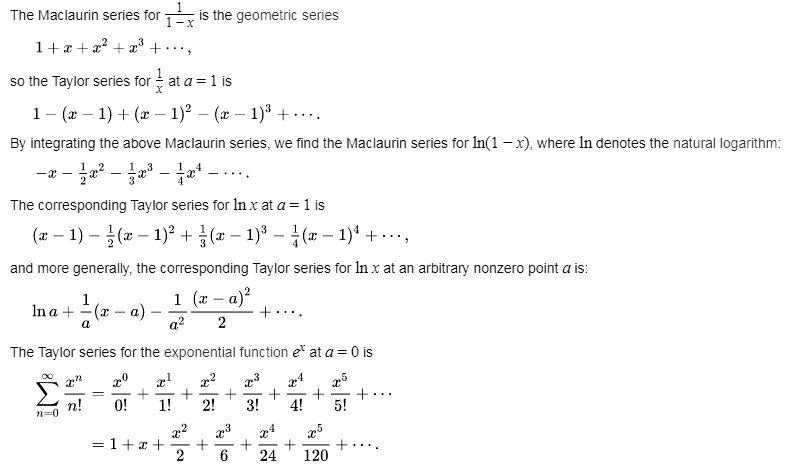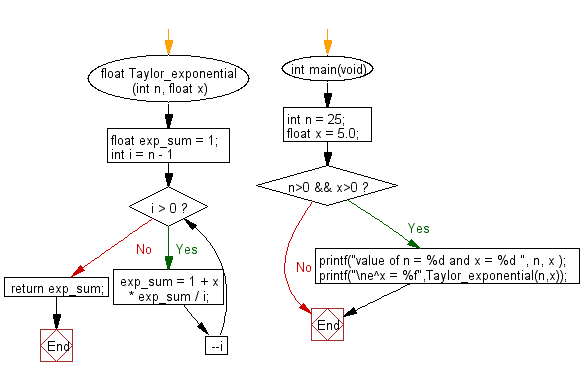C Exercises: Calculate e raise to the power x using sum of first n terms of Taylor Series
C Programming Mathematics: Exercise-24 with Solution
Write a C program to calculate e raise to the power x using sum of first n terms of Taylor Series.
From Wikipedia,
In mathematics, a Taylor series is a representation of a function as an infinite sum of terms that are calculated from the values of the function's derivatives at a single point.
Example:
The Taylor series for any polynomial is the polynomial itself.

The above expansion holds because the derivative of ex with respect to x is also ex, and e0 equals 1.
This leaves the terms (x − 0)n in the numerator and n! in the denominator for each term in the infinite sum.
Example:
Input: n = 25
float x = 5.0
Output: e^x = 148.413162
Sample Solution:
C Code:
#include <stdio.h>
#include <stdlib.h>
float Taylor_exponential(int n, float x)
{
float exp_sum = 1;
for (int i = n - 1; i > 0; --i )
exp_sum = 1 + x * exp_sum / i;
return exp_sum;
}
int main(void)
{
int n = 25;
float x = 5.0;
if (n>0 && x>0)
{
printf("value of n = %d and x = %d ", n, x );
printf("\ne^x = %f",Taylor_exponential(n,x));
}
}
Sample Output:
value of n = 25 and x = 1968710504 e^x = 148.413162
Flowchart:

C Programming Code Editor:
Improve this sample solution and post your code through Disqus.
Previous: Write a C program to find next smallest palindrome of a given number.
Next: Write a C program to print all prime factors of a given number.
What is the difficulty level of this exercise?
Test your Programming skills with w3resource's quiz.
C Programming: Tips of the Day
Static variable inside of a function in C
The scope of variable is where the variable name can be seen. Here, x is visible only inside function foo().
The lifetime of a variable is the period over which it exists. If x were defined without the keyword static, the lifetime would be from the entry into foo() to the return from foo(); so it would be re-initialized to 5 on every call.
The keyword static acts to extend the lifetime of a variable to the lifetime of the programme; e.g. initialization occurs once and once only and then the variable retains its value - whatever it has come to be - over all future calls to foo().
Ref : https://bit.ly/3fOq7XP
- New Content published on w3resource:
- HTML-CSS Practical: Exercises, Practice, Solution
- Java Regular Expression: Exercises, Practice, Solution
- Scala Programming Exercises, Practice, Solution
- Python Itertools exercises
- Python Numpy exercises
- Python GeoPy Package exercises
- Python Pandas exercises
- Python nltk exercises
- Python BeautifulSoup exercises
- Form Template
- Composer - PHP Package Manager
- PHPUnit - PHP Testing
- Laravel - PHP Framework
- Angular - JavaScript Framework
- Vue - JavaScript Framework
- Jest - JavaScript Testing Framework
